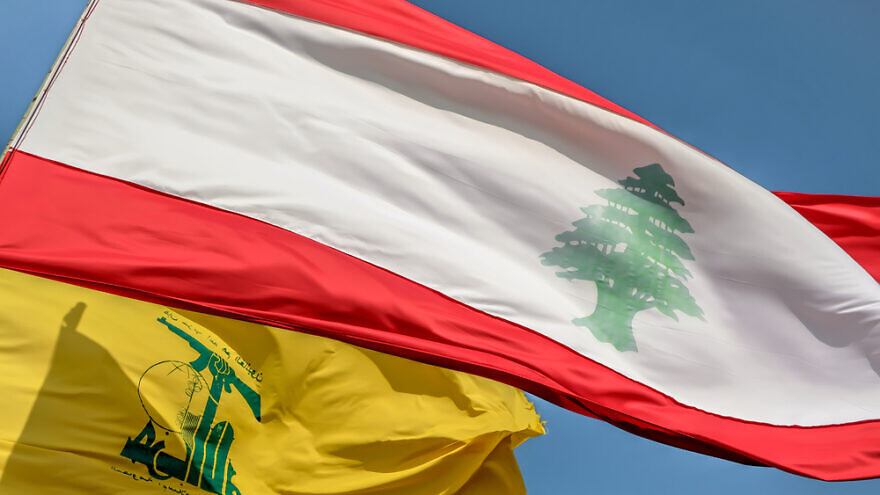If Lebanon, mired in a financial and political crisis, didn’t have enough problems, it has angered Saudi Arabia, an important economic patron. The Saudis have taken umbrage at comments made by Lebanon’s information minister. Some analysts, however, tell JNS that the comments were just a pretext—a way for the Saudis to express their long-simmering discontent with Beirut.
The remarks were made by Lebanon’s Minister of Information George Kordahi, who blamed Saudi Arabia for its “aggression” against the Houthi rebels in Yemen. Although he said this back in August before he joined the government—and Lebanon’s prime minister disavowed Kordahi’s statements—it wasn’t enough for the Saudis, who recalled their ambassador on Friday. In solidarity, Bahrain, Kuwait and the United Arab Emirates quickly followed suit, recalling their ambassadors as well.
If it seems far-fetched that comments made by a minor Lebanese minister before he became one should spark a diplomatic crisis, that’s because it is, analysts told JNS.
Saudi Arabia intensified its campaign against Hezbollah in recent months, she told JNS, noting that just last week the kingdom classified Hezbollah’s financial arm, Al-Qard Al-Hassan, as a terrorist entity.
Mizrahi said, “It’s a strategy. The Saudis want to weaken Hezbollah inside Lebanon, and they think that the way to do it is to pressure the Lebanese system and to make the Lebanese government even more dysfunctional than it already is.”
‘They no longer want to throw good money after bad’
Tony Badran, research fellow at the Washington, D.C.-based Foundation for Defense of Democracies, agreed that Kordahi’s remarks were just a pretext and that their timing may have been useful, but there were earlier signs of Saudi’s developing policy.
“You can trace it back to 2016 when the Saudis canceled a grant to the Lebanese armed forces. It was a big deal at the time that they withheld the money,” he told JNS. “The Saudis have long understood that Lebanon is an Iranian-controlled province, and they no longer want to throw good money after bad.”
The rationale used by Saudi allies to convince it to send money to Lebanon was that “we’re building up an anti-Hezbollah opposition,” explained Badran. It’s since become clear to the Saudis that “no such opposition exists, that the entirety of the [Lebanese] political class, all of the state and government institutions—the security sector, foreign policy, everything—is basically beholden to Hezbollah,” he said.
According to Badran, Saudi anger isn’t surprising as the Houthis—against whom the Saudis have been campaigning since 2015—enjoy a presence in Beirut.
“They work with Hezbollah. They have a TV station there. They get training there,” he said, noting that there’s a “narco aspect,” too, as Lebanon is a major exporter of the drug Captagon to Saudi Arabia. According to researchers in 2016, the amphetamine is one of the main causes of addiction in the kingdom.
Badran said it’s not clear if the diplomatic dispute will remain at the current level of intensity, but he said it’s possible that the Saudis could downgrade their diplomatic representation in Lebanon from an ambassador to a chargé d’affaires.
“The more critical aspect for Lebanon is whether the Saudis continue to block imports. And there is a rationale for it because of all those Captagon pills,” he said.
‘Hezbollah will be more at ease’
Not all view Saudi behavior as something planned. Daniel Pipes, president of the Middle East Forum, told JNS that the recent rift is a result of personality rather than policy.
“This latest episode is best understood in the context of [Saudi Crown Prince] Mohammed bin Salman’s temper. Acting before he thinks,” Pipes said of the leader known popularly as “MBS,: who serves as Saudi Arabia’s deputy prime minister and minister of defense.
Pipes said Saudi Arabia’s behavior fits bin Salman’s modus operandi. He noted the kingdom’s actions toward Qatar in 2017 when the Saudis severed diplomatic relations and denied Qatar access to its airspace. “Nobody’s ever quite figured out what caused this abrupt, sudden, complete absolute break with Qatar,” he said.
Still more apropos is the bizarre story of bin Salman demanding the resignation of Lebanon’s former Prime Minister Saad Hariri in December 2017, noted Pipes. Hariri, a longtime Saudi ally, arrived in the kingdom for what he thought would be a camping trip with the crown prince. Instead, he was handed a pre-written resignation speech that he was forced to read on Saudi television, presumably to instigate a collapse of his government, which included Hezbollah.
Bin Salman’s move backfired. Not only did Hariri recant his resignation the moment he returned to Lebanon, he became more popular, and Hezbollah grew stronger. The incident also strained Saudi’s relationship with its allies, including the United States.
This Saudi action will also backfire, said Pipes. “You can’t get the Lebanese government to join your side by doing this. It’s not going to work.”
Events so far appear to bear Pipes out. Kordahi refuses to step down as pro-Hezbollah government ministers back him. Reports suggest that Saudi’s move will play into Hezbollah’s hands. A former Lebanese parliament member told Arabic newspaper Asharq Al-Awsat, “Hezbollah will be more at ease as the divide between Lebanon and the Gulf widens.”
Pipes said it’s possible that the Saudis could drive Lebanon still further into Iran’s orbit, especially if they act towards Lebanon as they did towards Qatar. In that instance, the three-and-a-half year embargo by the Saudis and other Gulf States had the reverse of its intended effect. Instead of weakening Qatar’s relations with Turkey and Iran, it only served to strengthen them.


























